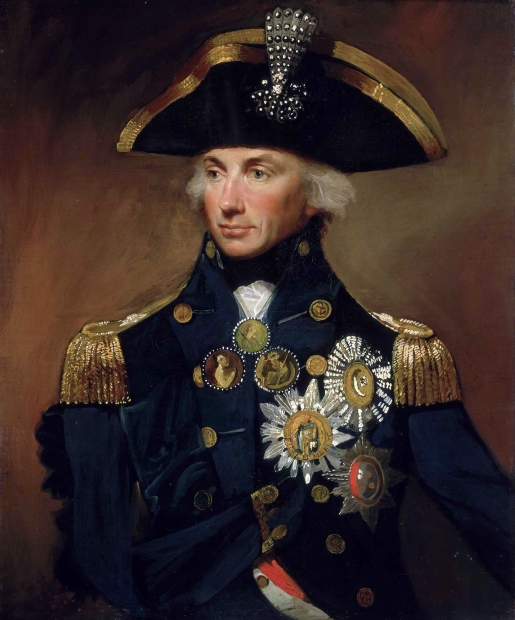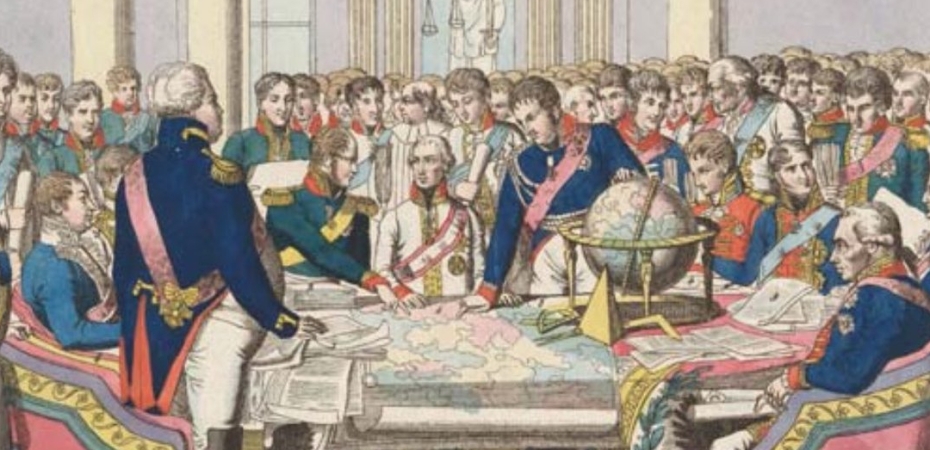How did the convergence of complex ideological, economic and military phenomena lead to the remarkable lack of warfare that made 1815-1914 one of the most peaceful periods in European History?
In contrast to the periods preceding and succeeding it, the lack of general, large-scale warfare in the period 1815-1914 is a remarkable feature of modern European history. The 20th century, the deadliest in human history, and pre-1815 Europe, defined by near-constant war between the great powers of the time, make the period 1815-1914 look relatively peaceful. This is all the more remarkable when one considers the period’s constant revolutions & coups, instability resulting from economic upheaval, and the gradual collapse of the European Ottoman Empire. This remarkable peace was the result of a combination of British economic and military dominance, the emergence of imperialism as a guiding foreign policy framework as a result of the European technological advantage, and an increased level of diplomatic cooperation amongst the conservative states resulting from the common threat of revolution they all faced.
An important factor in the distinct lack of general warfare in Europe in the period 1815-1914 was the unquestioned economic, military and colonial dominance established by Britain after the Revolutionary and Napoleonic Wars of 1792-1815. Arguably, the Napoleonic Wars were merely an extension of the Franco-British Conflict which had started in 1689 and included the War of the Spanish Succession, the Seven Years War and French support for secessionists in the American Revolution. Hobsbawm argues that ‘the fundamental conflict between Britain and France…had dominated European international relations for the best part of a century’, meaning when Napoleon’s combined French and Spanish fleet was destroyed at the Battle of Trafalgar in 1805, Britain’s position as the world’s dominant naval power was secured. Napoleon’s final defeat in 1815 at the Battle of Waterloo was the culmination of a century-long power struggle between the 2 most powerful European nation-states. After these two devastating blows, likened by many to Rome’s victory over Carthage, Britain could expand its maritime empire practically unhindered. This has led some historians to label the period from 1815-1914 the Pax Britannica; Britain was undisputed hegemon in a unipolar system. This concentration of power translated into a less fractious international environment (see Hegemonic Stability Theory) due to the deterrence provided by the near-insurmountable nature of Britain’s economic and military lead.

The revolutionary tide sweeping Europe post-1789 led to another key reason for the lack of general warfare in our period; cooperation between the old regimes of Europe. Europe’s absolute monarchies understood the existential threat posed by insurrections like that of 1789, and this fear galvanised cooperation amongst them. War was out of the question — Leopold I, with memories of the French Revolution still fresh, epitomised the mentality amongst Europe’s old elite when he warned that ‘in Europe’s present state of social illness it be unheard-of to let loose…a general war’, declaring that, ‘from what I know of Europe, I think that such a conflict would change her form and overthrow her whole structure’. The European diplomats negotiating at the Congress of Vienna clearly shared this perspective; their leniency in punishing France economically for the Revolutionary and Napoleonic Wars suggests they were not willing to risk socioeconomic unrest in what was Continental Europe’s most important nation (a lesson that should have been heeded in 1919 at Versailles!). Cooperation amongst the conservative monarchies, especially in the period from 1815-1848, was common. France intervened in Spain in 1820 to prevent the reinstatement of the liberal constitution of 1812, Austria-Hungary intervened in Italy multiple times to prevent it from uniting, and Russia put down a Hungarian nationalist revolt in Austria-Hungary in 1848. These examples are illustrative of the broader point that, out of a fear of revolution, conservative monarchies were willing to actively work with each other to maintain the status quo and avoid any form of instability that could provide revolutionary forces with an opportunity to assert themselves. Such cooperation ensured that the chances of a general war remained minimal.

The emergence of imperialism and colonialism as guiding foreign policy doctrines further reduced the risk of a general European war by exporting conflict and satiating nationalist demands on far-flung continents rather than in Europe. Ultimately, the feasibility of these policies was rooted in the economic and military advantage that European states had derived from the Great Divergence and Industrial Revolution. The prospect of easily exploiting overseas territories reduced the need for war on the continent as it allowed nations to satiate their nationalist desire for conquest and glory, their economic desire for resources and markets, and their territorial desire for border expansion away from the continent. Had this dynamic not been present, the emergence of new powers on the continent (Germany and Italy) would have led to a rapid deterioration in the balance of power in 1871 as they pursued expansionism at the expense of their European neighbours. From the German perspective, militarily crushing and systematically exploiting natives of, say, Namibia or Cameroon, was a much more appealing prospect than warring with her economically developed and militarily powerful neighbours. In this sense, efforts to capture and consolidate colonial holdings often provided a profitable distraction from intra-European disputes. Given the aforementioned military and naval dominance Britain had established after the Napoleonic Wars, she was one of the most active imperialist powers of the period. Russia also had imperialist ambitions, mainly focused on Central Asia, but British interests, namely, the protection of India as a British colony, clashed with this Russian desire. In the past, this may have led to multiple direct confrontations on the European continent. Instead, bar 3 years of war in the Crimea, nearly a century Anglo-Russian rivalry mainly played itself out thousands of miles away from the European mainland. It is easy to see why; in the Crimean War, the British lost over 40,000 troops in a vicious, protracted 3-year conflict, whilst in the first Anglo-Afghan War, she lost only 4,700. Europeans were content to play proxy-driven geopolitical chess in far-flung territories where the natives posed a negligible military threat and represented great economic opportunities. Hobsbawm summarises when he argues that, over the course of the period 1815-1914, the world witnessed ‘the most spectacular expression of the growing division of the globe into the strong and the weak’. The economic trends of the period meant that European nations could outsource their territorial and economic expansion away from their native continent to the much more lucrative non-capitalist world, thereby reducing the appeal of continental confrontation.

The distinct lack of general warfare on the European continent was the result of three key factors. Firstly, post-1815, the emergence of Britain as unquestioned world hegemon as a result of her lead in political and economic development created a stable and unipolar international environment in which the chances of a multilateral European war were drastically reduced. Secondly, in reaction to the emergence of revolutionary ideologies in 1789, conservative statesmen and diplomats were willing to be much more pragmatic and to actively cooperate in order to maintain the status quo and avoid instability in the face of their common revolutionary enemy, thereby reducing the risk of confrontation and belligerency between such ideologically aligned nations. Finally, the Industrial Revolution facilitated the export of territorial expansionism and economic exploitation to the non-European stage, diverting the attention and resources of increasingly nationalist European powers away from each other, further reducing the risk of confrontation, especially in the later 19th century and early 20th century.
BIBLIOGRAPHY:
- L. James, The Rise and Fall of the British Empire, London, Abacus, 1995
- J. Sperber, Revolutionary Europe 1780-1850, Oxon, Routledge, 2017
- E. Hobsbawm, The Age of Revolution, London, Abacus, 1962
- E. Hobsbawm, The Age of Empire, London, Abacus, 1987
- A. Sked, The Metternich System, in A. Sked, et al., Europe’s Balance of Power 1815-1848, London, Macmillan Press, 1979
- E. J. Feuchtwanger, Imperial Germany, 1850-1918, London, Routledge, 2001
- W. Wohlforth, The Stability of a Unipolar World, ‘International Security’, Vol. 24, No. 1, 1999: 5-41
- W. Brown, et al., Volatility in an Era of Reduced Uncertainty: Lessons from Pax Britannica, Cambridge, Mass., National Bureau of Economic Research Working Paper Series no. 11319, 2005
- T. Chapman, The Congress of Vienna : origins, processes, and results, London, Routledge, 1998
- R. Bridge, Allied Diplomacy in Peacetime, in A. Sked, et al., Europe’s Balance of Power 1815-1848, London, Macmillan Press, 1979
- H. Kissinger, The White Revolutionary: Reflections on Bismarck, ‘Daedalus 97’, No. 3, 1968: 888-924
- B. Vandervort, Wars Of Imperial Conquest, London, Routledge, 1998
- G. Morgan, Anglo-Russian Rivalry in Central Asia 1810-1895, Totowa, Frank Cass and Company, 1981

interesting. I fear we do not have the wisdom to learn from our past. Thank you for following my blog. I hope you enjoy your visits.
LikeLiked by 1 person
Impressive. If only our politicians were so conversant with history.
LikeLiked by 1 person
Hello again, Adam,
Thanks for following beetleypete this time. It’s less opinionated. 🙂
Best wishes, Pete.
LikeLike
It sounds likely enough – ‘Don’t upset the applecart because you don’t know where it will lead’. But the peace was broken by the Franco-Prussian War, was it not? And it did lead to the Paris Commune, and who knows how near the revolutionary tipping point that was.
LikeLiked by 1 person
Very true David, though I would question the degree to which the Franco-Prussian War can be considered a ‘general’ European War. I should have said explicitly in the article that it was the lack of multilateral conflict like the World Wars of the following century that I was seeking to explain.
Thanks for taking the time to comment.
LikeLiked by 1 person
Yes, I did think about the general drift of your article and the 1870 war being with just two parties involved. Then I thought that they were the big players in Europe, so I made the point. Thanks for your reply.
LikeLiked by 1 person
If Britain was a contributing factor to this lack of warfare in the 19th century, she was the main instigator of the World Wars in the 20th century. A good book, written by one far smarter than I, is How Britain Initiated Both World Wars, by Nick Kollerstrom. It is worth reading.
LikeLiked by 1 person
Reblogged this on Truth Troubles.
LikeLike
Hi Adam and thanks for dropping by and deciding to follow. On spotting this title and diving in it took me straight back to my school days and delight in modern Euro-American history – just like taking a trip in a time machine!
LikeLiked by 1 person
Keep on working, great job!
LikeLike
Excellent post!
Obviously, the rise of British power – via the Industrial Revolution, nationalism, + colonialism, played a role in creating a quasi uni-polar world at the time. In addition, the cooperation that other major European countries exhibited in controlling uprisings through the continent is quite noteworthy.
Another interesting point I’ve heard elsewhere is that many countries lacked the financial resources for protracted conflict in the era that pre-dated the rise of central banking in the 20th century.
I look forward to more posts from you when able. 🙂
LikeLike